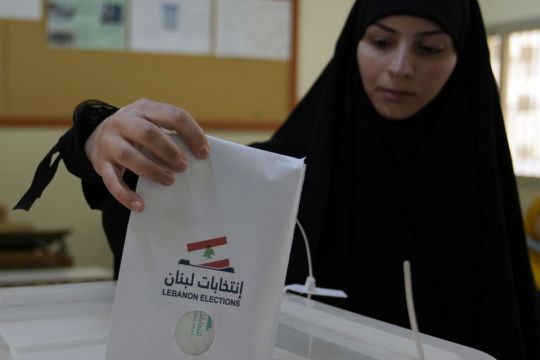Voter are at the polls in Lebanon to elect a new parliament against the backdrop of an economic meltdown that is transforming the country and low expectations that the ballot will significantly alter the political landscape.
A new crop of candidates from the 2019 protest movement are running against the country’s entrenched ruling class that is blamed for the collapse, hoping to unseat them.
But they are divided and lack the money, experience and other advantages held by traditional political rulers.
People began casting their ballots shortly after the polls opened on Sunday morning under the watchful eye of security forces that have fanned out across the country.

The vote is the first since Lebanon’s implosion started in October 2019, triggering widespread anti-government protests.
It is also the first election since the massive August 2020 explosion at Beirut’s port that killed more than 200 people, injured thousands and destroying parts of the capital.
The blast, widely blamed on negligence, was set off by hundreds of tons of poorly stored ammonium nitrate that ignited in a port warehouse after a fire broke out at the facility.
The voting is seen as a last chance to reverse course and punish the current crop of politicians, most of whom derive their power from Lebanon’s sectarian political system and spoils taken at the end of its 15-year civil war in 1990.

But expectations for real change are low amid scepticism and widespread resignation that the vote is sure to bring back the same political parties.
Rabah Abbas, 74, said after casting his ballot in Beirut: “I did what I can do and I know the situation will not change 180 degrees.”
He fears the election is only symbolic and that Lebanon will be stuck again in post-election political bickering over the formation of a new government and electing a new president in October.
“We will hit a wall again. Lebanon is a hopeless case,” he added.
The extent of Lebanon’s collapse was on display on Sunday. In the northern city of Tripoli, Lebanon’s most impoverished city, several polling stations were without electricity and voters had to climb several flights of stairs to cast their ballots.

Voters were seen using the light from mobile phones to check the ballot paper before making their selection.
Since the meltdown began, tens of thousands of people have lost their jobs, the Lebanese pound has shed more than 90% of its value and many have left the country seeking opportunities abroad.
Three-quarters of the country’s six million people, including one million Syrian refugees, now live in poverty.
The World Bank has described Lebanon’s collapse as one of the world’s worst in the past 150 years.
Some 718 candidates on 103 lists are running for seats in the 128-member parliament.
The vote is held once every four years. In 2018, voters gave the powerful Hezbollah and its allies the majority with 71 seats.







